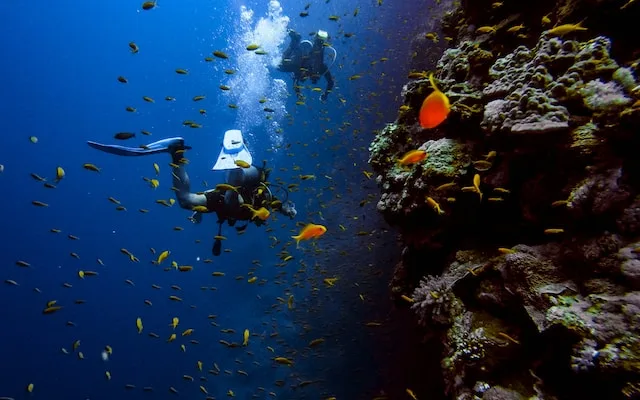Scuba diving weight refers to the additional weight carried by divers to achieve proper buoyancy control underwater. The weight compensates for the positive buoyancy of diving equipment and exposure suits. It allows divers to achieve neutral buoyancy, where they neither sink nor float, facilitating better control, comfort, and safety during their dives.
Scuba Diving Weight Calculator
| Question | Answer |
|---|---|
| How do I calculate how much weight I need for diving? | Perform a buoyancy check to achieve neutral buoyancy at a safety stop. |
| Can I dive and be obese? | Diving while obese may present additional risks and challenges. Consult with a dive professional or doctor experienced in diving medicine. |
| How do you know if you are properly weighted for scuba diving? | Conduct a buoyancy check in shallow water and aim for neutral buoyancy at a safety stop. |
| How heavy is a standard dive weight? | Typically ranges from 1 to 5 pounds (0.45 to 2.27 kilograms). |
| What is the 120 rule in scuba diving? | Suggests limiting maximum depth to 120 feet (36 meters) to minimize decompression sickness risk. Follow dive tables or computer recommendations. |
| What is the formula for weight underwater? | Weight on land divided by the specific gravity of water. |
| What is the number 1 rule of diving? | Always dive within your training and experience limits. |
| How can I reduce my diving weight? | Adjust buoyancy control, improve trim and body position, optimize gear setup, and fine-tune weighting. |
| What is the ideal body type for diving? | Focus on physical fitness, flexibility, and overall health rather than body type. |
| Do they weigh you before scuba diving? | Yes, dive operators typically weigh divers before diving to ensure proper weighting for buoyancy control. |
FAQs
- How do I calculate how much weight I need for diving? The weight needed for diving depends on factors such as body composition, exposure protection, equipment, and water conditions. A common method is to perform a buoyancy check by adding or subtracting weights until you achieve neutral buoyancy at a safety stop.
- Can I dive and be obese? Diving while obese may present additional risks and challenges, such as higher gas consumption and potential difficulty with buoyancy control. It’s important to consult with a dive professional or doctor experienced in diving medicine to assess individual suitability and discuss any specific concerns.
- How do you know if you are properly weighted for scuba diving? You can determine if you are properly weighted by conducting a buoyancy check in shallow water. Your goal is to achieve neutral buoyancy at a safety stop, where you can hover motionless at eye level without sinking or floating.
- How heavy is a standard dive weight? A standard dive weight typically ranges from 1 to 5 pounds (0.45 to 2.27 kilograms). The weight needed depends on factors such as body composition, exposure protection, and equipment.
- What is the 120 rule in scuba diving? The 120 rule is a guideline that suggests divers limit their maximum depth to 120 feet (36 meters) to minimize the risk of decompression sickness. It is not a strict rule, and divers should follow their training and adhere to the appropriate dive tables or dive computer recommendations.
- What is the formula for weight underwater? The formula to calculate weight underwater is the weight on land divided by the specific gravity of the fluid (water). However, during scuba diving, weight calculations are more complex and involve factors such as exposure protection, equipment, and personal buoyancy characteristics.
- What is the number 1 rule of diving? The number one rule of diving is to always dive within your training and experience limits. This means staying within the depth and conditions for which you have been certified and having the necessary skills and knowledge to handle any potential situations that may arise.
- How can I reduce my diving weight? To reduce diving weight, you can try adjusting your buoyancy control, improving your trim and body position, optimizing your gear setup, and ensuring proper weighting through buoyancy checks and fine-tuning.
- What is the ideal body type for diving? There is no specific ideal body type for diving. Divers come in various shapes and sizes. It’s important to focus on physical fitness, flexibility, and good overall health rather than body type.
- Do they weigh you before scuba diving? Yes, dive operators often weigh divers before scuba diving to ensure they are properly weighted for buoyancy control and safety underwater.

GEG Calculators is a comprehensive online platform that offers a wide range of calculators to cater to various needs. With over 300 calculators covering finance, health, science, mathematics, and more, GEG Calculators provides users with accurate and convenient tools for everyday calculations. The website’s user-friendly interface ensures easy navigation and accessibility, making it suitable for people from all walks of life. Whether it’s financial planning, health assessments, or educational purposes, GEG Calculators has a calculator to suit every requirement. With its reliable and up-to-date calculations, GEG Calculators has become a go-to resource for individuals, professionals, and students seeking quick and precise results for their calculations.

